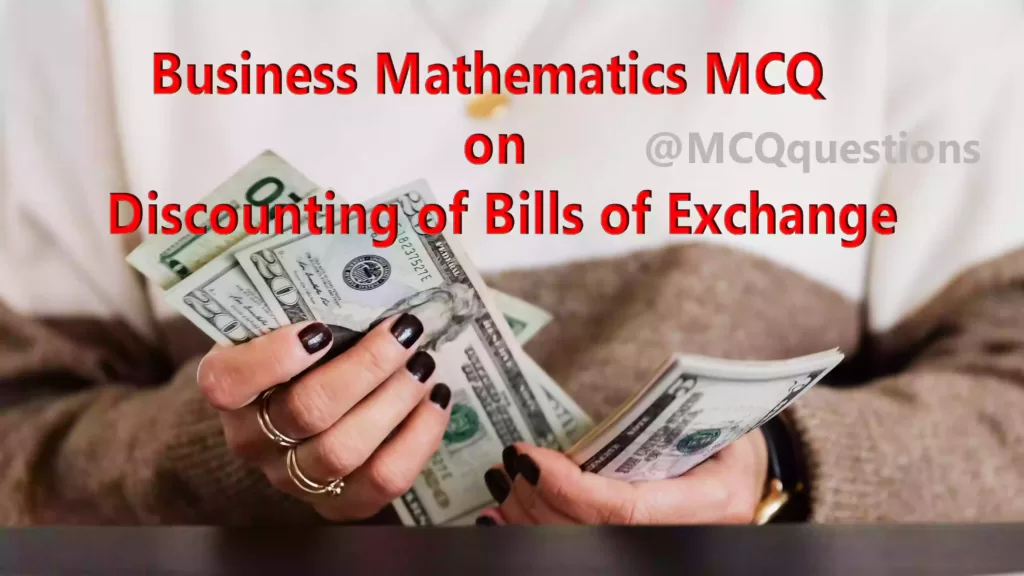MCQ on Discounting of Bills of exchange

Business Mathematics MCQ on Discounting of Bills of exchange
Here you can get the MCQ on Discounting of Bills of exchange. We are trying to give our best for your MCQ problems. Also Read Business Mathematics MCQ
Also You Can Read:
- MCQ on Profit and Loss
- MCQ on Partnership
- MCQ on Logarithms
- MCQ on Simple and Compound interest
- MCQ on Annuities
- MCQ on Discounting of Bills of exchange
- MCQ on Stocks and Shares
1. The Simple interest on the present value of a bill is:
(a) True Discount
(b) Banker’s Discount
(c) Cash Discount
(d) Trade Discount
Answer – (a) True Discount
2. The Simple interest on the Bill value of a bill is:
(a) True Discount
(b) Banker’s Discount
(c) Cash Discount
(d) Trade Discount
Answer – (b) Banker’s Discount
3. The Simple interest on the True discount of a bill is:
(a) True Discount
(b) Banker’s Discount
(c) Banker’s Gain
(d) Bill Value
Answer – (c) Banker’s Gain
4. Excess of Banker’s discount over True discount is :
(a) True Discount
(b) Banker’s Discount
(c) Cash Discount
(d) Banker’s Gain
Answer – (d) Banker’s Gain
5. The date which falls after addition of the term of the bill is :
(a) Nominal due date
(b) Legal due date
(c) After date bill
(d) After sight bill
Answer – (a) Normal due date
6. The kind of bill where the nominal date is calculated from the date of acceptance of
the bill is:
(a) Nominal due date
(b) Legal due date
(c) After date bill
(d) After sight bill
Answer – (d) After sight bill
7. The kind of bill where the nominal date is calculated from the date of drawal of the bill is:
(a) Nominal due date
(b) Legal due date
(c) After date bill
(d) After sight bill
Answer – (c) After date bill
8. The date which falls after addition of 3 days of grace in the nominal due date is:
(a) Nominal due date
(b) Legal due date
(c) After date bill
(d) After sight bill
Answer – (b) Legal due date
9. The period between the date of retirement of Bill and the legal due date is:
(a) Nominal due date
(b) Legal due date
(c) Discounting period
(d) After sight bill
Answer – (c) Discounting period
10.The Bills of exchange is regulated by an Act :
(a) Negotiable instrument Act 1881
(b) Bills of exchange Act 1882
(c) Bills of exchange Act 1949
(d) None of the Above
Answer – (a) Negotiable instrument act 1881
11. If The banker’s discount due for 4 months @ 15% = 420.Then The true discount is:
(a) 460
(b) 400
(c) 380
(d) 360
Answer – (b) 400
12.The banker’s gain due for 3 years @ 12% per annum is 270. The banker’s
discount is:
(a) 2010
(b) 1020
(c) 920
(d) 760
Answer – (b)1020
13.The present worth of a sum = Rs.576 , the banker’s gain = Rs. 16. The true discount is
(a) 86
(b) 72
(c) 42
(d) 96
Answer – (d) 96
14.If the legal due date of a bill falls on a usual bank holiday, the Bill is payable on:
(a) The day before
(b) The day after
(c) The same day
(d) Two days after
Answer – (a) The day before
15. The true discount of a bill is equal to
(a)BVxRxT/100+RxT
(b) BV-BD
(c) B.V./1+RxT
(d) PV (1+ Rx T)
Answer – (a) BVxRxT/100+RxT
16. The banker’s discount due 2 years, hence is 11/10 of true discount.
Then the rate of percentage is
(a) 15%
(b) 10%
(c) 5%
(d) 5.5%
Answer – (c) 5%
17. The banker’s discount is Rs. 72 and the true discount is Rs. 60. The sum due is:
(a) 360
(b) 460
(c) 540
(d) ₹ 440
Answer – (a) 360
18.The Banker’s gain on a bill due one year hence at 12% per annum is 60. The true
discount is :
(a) ₹ 720
(b) 360
(c) 540
(d) 500
Answer – (d) 500
19.The present worth of ₹ 930 due 3 years @ 8% per annum is
(a) 950
(b) 850
(c) 750
(d) 700
Answer – (c) 750
20. If true discount on ₹ 360 due 4 years hence is ₹ 60, then rate of interest is :
(a) 5%
(b) 7.5%
(c) 5.5%
(d) 4.5%
Answer – (a) 5%
